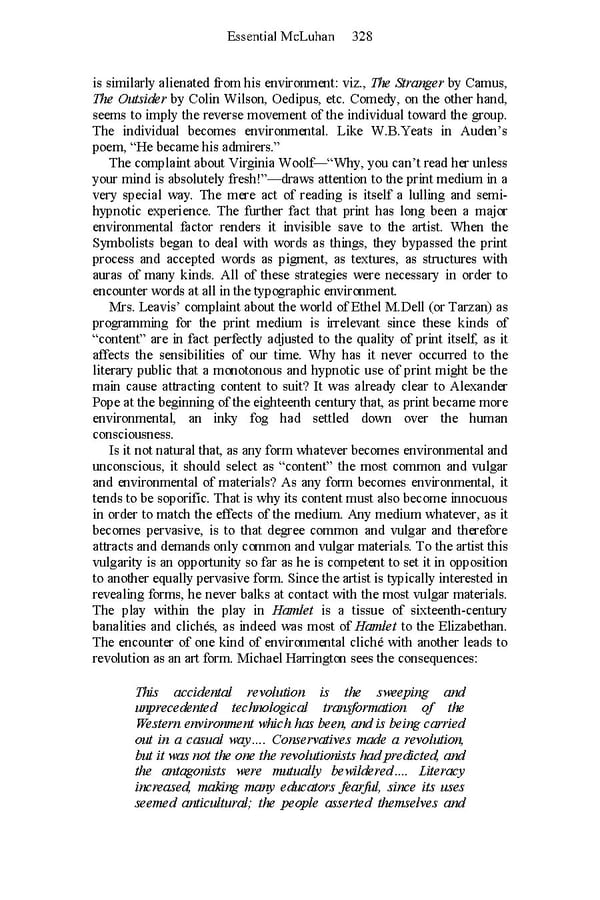Essential McLuhan 328 is similarly alienated from his environment: viz., The Stranger by Camus, The Outsider by Colin Wilson, Oedipus, etc. Comedy, on the other hand, seems to imply the reverse movement of the individual toward the group. The individual becomes environmental. Like W.B.Yeats in Auden’s poem, “He became his admirers.” The complaint about Virginia Woolf—“Why, you can’t read her unless your mind is absolutely fresh!”—draws attention to the print medium in a very special way. The mere act of reading is itself a lulling and semi- hypnotic experience. The further fact that print has long been a major environmental factor renders it invisible save to the artist. When the Symbolists began to deal with words as things, they bypassed the print process and accepted words as pigment, as textures, as structures with auras of many kinds. All of these strategies were necessary in order to encounter words at all in the typographic environment. Mrs. Leavis’ complaint about the world of Ethel M.Dell (or Tarzan) as programming for the print medium is irrelevant since these kinds of “content” are in fact perfectly adjusted to the quality of print itself, as it affects the sensibilities of our time. Why has it never occurred to the literary public that a monotonous and hypnotic use of print might be the main cause attracting content to suit? It was already clear to Alexander Pope at the beginning of the eighteenth century that, as print became more environmental, an inky fog had settled down over the human consciousness. Is it not natural that, as any form whatever becomes environmental and unconscious, it should select as “content” the most common and vulgar and environmental of materials? As any form becomes environmental, it tends to be soporific. That is why its content must also become innocuous in order to match the effects of the medium. Any medium whatever, as it becomes pervasive, is to that degree common and vulgar and therefore attracts and demands only common and vulgar materials. To the artist this vulgarity is an opportunity so far as he is competent to set it in opposition to another equally pervasive form. Since the artist is typically interested in revealing forms, he never balks at contact with the most vulgar materials. The play within the play in Hamlet is a tissue of sixteenth-century banalities and clichés, as indeed was most of Hamlet to the Elizabethan. The encounter of one kind of environmental cliché with another leads to revolution as an art form. Michael Harrington sees the consequences: This accidental revolution is the sweeping and unprecedented technological transformation of the Western environment which has been, and is being carried out in a casual way…. Conservatives made a revolution, but it was not the one the revolutionists had predicted, and the antagonists were mutually bewildered…. Literacy increased, making many educators fearful, since its uses seemed anticultural; the people asserted themselves and
 Essential McLuhan Page 334 Page 336
Essential McLuhan Page 334 Page 336